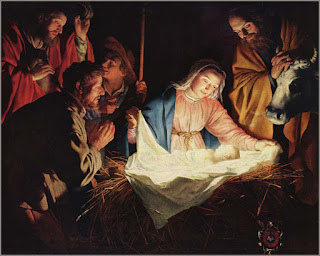The Feast of Epiphany -Readings: Isaiah 60:1–6; Ephesians 3:2–3, 5–6; Matthew 2:1–12
(Adoration of the Magi, Jan Boeckhorst, 1652)
The feast of Epiphany, in other words, the manifestation of our Lord, is an important event in the liturgical calendar. This feast brings us to the end of season that we started with First Sunday of Advent. While reading the narrative of those three wise men in search of baby Jesus sets us to think three important factors, in light of revelation of God and His work amidst us.
1. Confusion and clarity
2. Protection and proclamation
3. Mystery has a indilutable meaning.
I
Firstly, confusion and clarity: The Gospel of Matthew says, "When King Herod heard this he was disturbed, and all Jerusalem with him" (Mt 2:3). God works through confusion. There was a reason for King Herod and his palace to get disturbed and confused. Our God is a God of light and not of darkness. When God's light enters into the reign of darkness then there is confusion, commotion and terrific disturbance. This is happens for a good reason. The clarity does not come out just like that, without a whisk or leaving its deep traces. Clarity has its costs.
God empowers those who are ready to hear and listen to him. The three wise men belong to this group of people who believed when one door closes another opens. God opens the door to these non-Jews and non-Romans. In fact, God had bigger, brighter and better plans. God brings clarity about His sovereignty to those who do not know him yet. The kingdom of God belongs to everyone even to those who are not within the purview of those "first called". Sometimes God can bring out good out of those evil people like Herod, at least, in pointing out the right direction even though they may not follow. Which evil man or woman wants to follow the right path even when the way to heaven is clear? The men in the Herod's palace were able to guide the magi in their search for the source eternal life, Jesus Christ. However, once the magi's task is accomplished God gives them different direction, a right sight to see in everything indomitable clarity and follow that path. Therefore, they need no more the star that they saw earlier. Thus they follow the vision or the path shown by God to reach their destiny.
II
Secondly, protection and proclamation: God's work continues uninterrupted. Even when there is opposition or insecurity, still God knows how to protect His good work. The rescue and the evacuation of baby Jesus, and the parents, Joseph and Mary happens in a unique but in a bold way. God wants his work to be proclaimed to the ends of the earth. Therefore He chooses a person of his own. When there is threat at the very initial stages of its operation, God counters it very boldly with magnificent attitude of self-worth. The very protection of baby Jesus becomes a sign of proclamation. God makes known His presence and His work to His people through signs and wonders. This is what the feast of Epiphany is all about. God's work cannot be destroyed. God cannot be challenged. Instead, God can only be encountered. Am I ready for this task?
III
Thirdly, mystery has a definite meaning. Often, we find difficult to find meaning in the mystery of Incarnation of God in the world. St Paul writing to the Ephesians emphasises that God through His grace has revealed to us the mystery of God's coming into this world. So, the new era of salvation belongs to all. God continues to shape us and fashion us in that mystery. No one has seen God but through Jesus we know God. God empowers us to know the mystery of God's life. God does not hide from us but opens himself to us provided we are ready to listen to him and work accordingly. God sends his people to proclaim Him. The wise men from the East are those who did this first job of proclaiming the mystery of Incarnation to the world.
Through the gifts the magi bring gold, frankincense, and myrrh, God reveals himself that those who are baptised in Christ are just like him embodied with kingship, priesthood and prophetic role. In other words, we become partakers in His mission; moreover, "become partakers of the divine nature" (2 Peter 1: 4).
Olvin Veigas, SJ
The Feast of Epiphany (05.01.2020)









